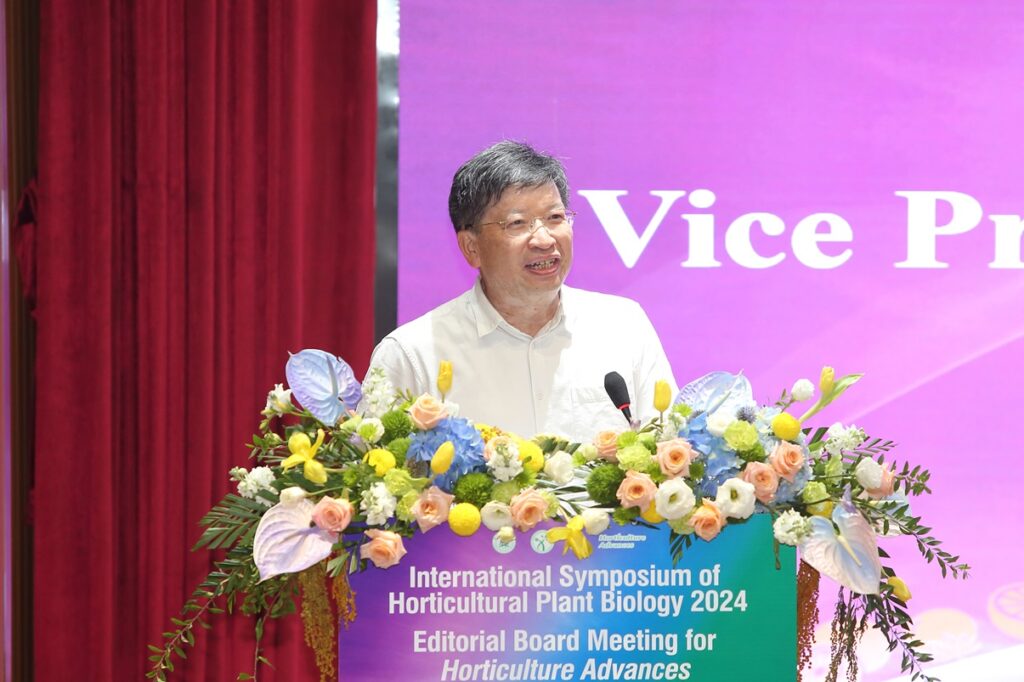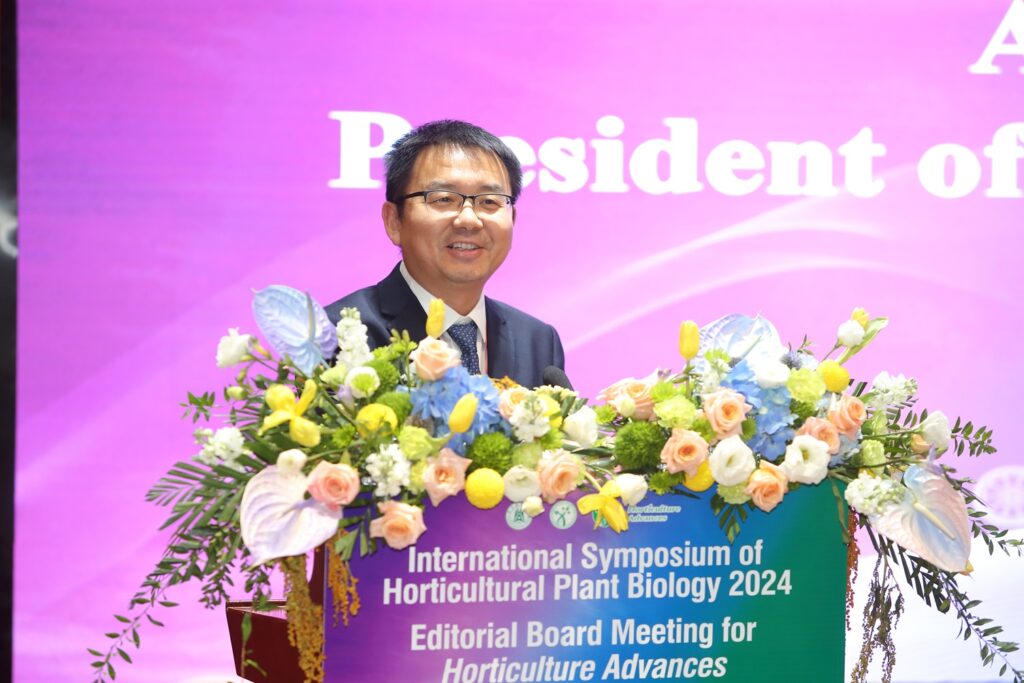
From October 13 to 15, the International Symposium of Horticultural Plant Biology 2024 was held at our university. Hosted by Huazhong Agricultural University and co-organized by the National Key Laboratory for Germplasm Innovation and Utilization of Horticultural Crops, the Joint International Research Laboratory of Germplasm Innovation and Utilization of Horticultural Crops, the College of Horticulture & Forestry Sciences, and the Editorial Office of Horticulture Advances, the event welcomed over 200 teachers and students from 44 domestic and international institutions.
Vice President of the Chinese Academy of Engineering and our university professor Academician Xiuxin Deng, along with university President Professor Jianbing Yan, attended the opening ceremony and delivered speeches.

Academician Xiuxin Deng emphasized in his speech that horticulture plays a crucial role in ensuring food security, protecting biodiversity, and improving environmental quality. He highlighted that in-depth exchanges and cooperation among international peers are vital for promoting the cultivation of high-quality, efficient, and disease-resistant new varieties, as well as the development of new breeding technologies. He expressed hope that participants would showcase the most advanced horticultural research achievements and applications through academic exchanges, spark intellectual inspiration, and jointly advance innovation and development in the horticultural discipline.

President Jianbing Yan introduced the university’s horticultural discipline and the National Key Laboratory for Germplasm Innovation and Utilization of Horticultural Crops. He highlighted that horticulture is one of the university’s traditional strengths, and the National Key Laboratory is the most important research platform in China’s horticultural field. The discipline and laboratory have brought together innovative and dynamic research groups covering the entire horticultural industry chain. They have achieved a series of internationally influential landmark results in areas such as the preservation of horticultural crop germplasm resources, genetic and gene discovery of important traits, development of cell engineering and molecular breeding technologies, and new variety breeding.
He mentioned that in this new era, the discipline and laboratory have proposed the concept of building an international horticultural research exchange platform. Establishing an international platform for scientific and technological innovation and talent cultivation in horticulture is a powerful measure to promote new growth. President Yan expressed hope that participants would engage in in-depth discussions and exchanges, enjoy the academic feast, and stimulate innovative inspiration.
During the two-day conference, 18 scholars from universities and research institutions such as Cornell University (USA), the University of Maryland (USA), the National Laboratory of Genomics for Biodiversity (Mexico), the National Research Institute for Agriculture, Food and Environment (France), the Australian National University, the Institute of Plant Sciences of Montpellier (France), The New Zealand Institute for Plant & Food Research, Kyoto University (Japan), Nagoya University (Japan), the University of Birmingham (UK), and the Institute of Genetics and Developmental Biology of the Chinese Academy of Sciences delivered keynote speeches. Topics covered included plant cell and developmental biology, plant grafting and cell communication, plant resistance biology, fruit sensory quality biology, and molecular breeding technology. The conference also featured a student forum where four of our university’s students presented their latest research progress.
In addition, meetings of the Horticulture Advances editorial board and the International Academic Committee of the Joint International Research Laboratory of Germplasm Innovation and Utilization of Horticultural Crops were held during the event. Some international participants were invited to engage in horticultural activities featuring traditional Chinese culture and to visit China’s main citrus-producing areas. Key representatives from the Scientific and Technological Development Research Institute, the International Cooperation and Exchange Department, the College of Horticulture & Forestry Sciences, and the National Key Laboratory attended the opening ceremony.
The International Symposium on Horticultural Plant Biology has now been held for five consecutive years. Focusing on hot topics in horticultural research, the conference jointly explores frontier research in horticultural plant biology, exchanges ideas, and methods, and provides an excellent communication platform for promoting international exchanges and high-level development of the horticultural discipline and the national key laboratory.

